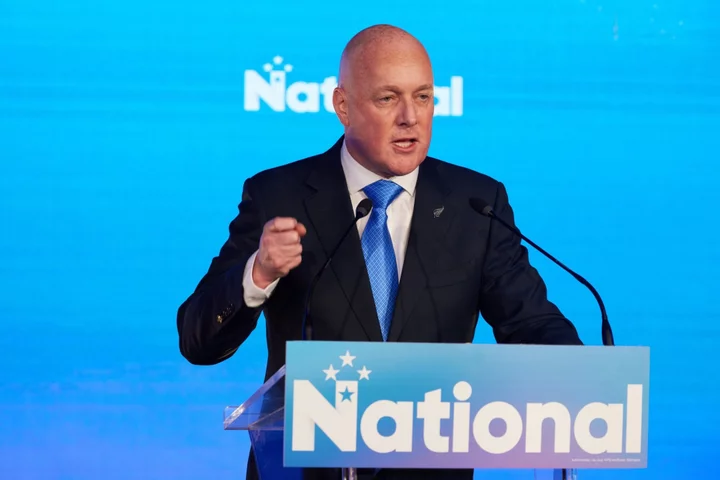New Zealand’s National Party will form a center-right government with two smaller partners after reaching agreement on policies and cabinet positions in talks that lasted almost six weeks.
National will lead a three-way coalition with the libertarian ACT Party and the nationalist New Zealand First Party, Prime Minister-elect Christopher Luxon said Friday in Wellington.
“I said on election night that we would be a government that would deliver for every New Zealander, regardless of who we are, where we are and whatever our life circumstances,” he said. “How the coalition parties do that has been at the core of our negotiations.”
At the Oct. 14 election, National won enough votes to oust the ruling Labour Party but not enough to hold a majority in parliament. Preliminary discussions to form a new government began soon after the vote but negotiations became more intense once official results on Nov. 3 showed that National would need New Zealand First as well as its ally ACT to govern.
Luxon said New Zealand First leader Winston Peters will be Deputy Prime Minister for the first half of the three-year term, with ACT leader David Seymour filling the role for the second half. Peters will be Foreign Minister and Seymour will be Minister for Regulation. Both smaller parties will have three seats in the 20-seat cabinet.
National’s Nicola Willis has been confirmed as Minister of Finance.
“The government will manage a strong economy that will ease the cost of living and deliver tax relief, restore law and order, deliver better public services and strengthen democracy,” Luxon said.
He said the coalition agreements between National and each smaller party “support the major elements of National’s policy program including our 100-day plan, our 100-point economic plan, and our tax and fiscal plans, with some adjustments.”
Tax Cuts
National’s proposed tax cuts will proceed but they will no longer be partly funded by allowing foreigners to purchase houses worth more than NZ$2 million ($1.2 million) and applying a levy to those transactions. Funding will instead come from a combination of spending reprioritization and additional revenue measures.
The coalition parties have adopted ACT’s policy to speed up the rate at which interest deductibility for rental properties is restored, Luxon said.
The coalition agreement says the government will narrow the Reserve Bank’s remit to focus on price stability, and take advice on replacing “medium term” with specific time targets.
It will also take advice on removing the Treasury observer from the Monetary Policy Committee and returning to a single decision maker model, the agreement says.
A new agency, accountable to Seymour as Minister for Regulation, will assess the quality of new and existing regulation. This agency will be funded by disestablishing the Productivity Commission.
A Regional Infrastructure Fund proposed by New Zealand First will have NZ$1.2 billion in capital funding.
There will be five ministers from National, two from ACT and one from New Zealand First outside cabinet, while ACT and New Zealand First will each have one parliamentary under-secretary.
While coalition governments are common under the proportional representation system that New Zealand adopted in 1996, it is the first time that three parties have entered into such an agreement.
New Zealanders turned to parties on the right of the political spectrum after growing frustrated with left-leaning Labour, the party of former prime minister Jacinda Ardern.
Ardern won global praise for her leadership during the Covid-19 pandemic but her prolonged use of lockdowns and social restrictions became divisive, while Labour’s failure to deliver some of its promises also drew criticism.
Ardern stood down in January and her successor Chris Hipkins walked back some of her policies, but it was not enough to turn the tide and win Labour a third term.
--With assistance from Ainsley Thomson.
(Update with details throughout)









